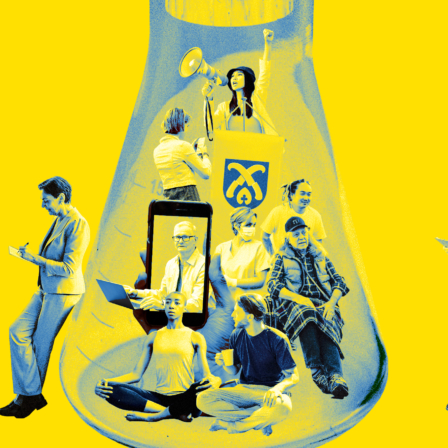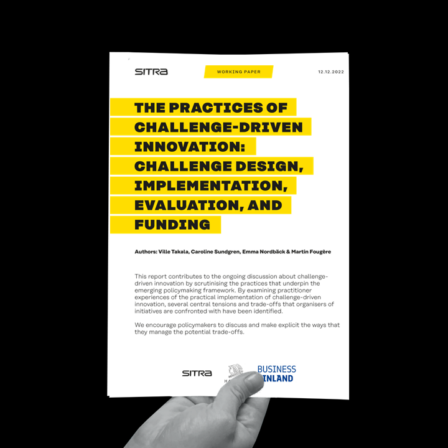Over the past two months, I have been intensively involved in building a training course to develop leadership competences in the public sector. The training is part of Sitra’s Public Sector Leadership focus area, which will support the development of an improved co-operation culture in public administration and in the planning of public policy.
At the same time, I have been struggling with the eternal problem faced by everyone building a training programme: what fits it and what doesn’t? The time on the clock and in the calendars of those attending training is limited, so the choices concerning content should be very carefully considered. When I make room in the programme for one theme or working method, which issue needs to be cleared out of the way and which matters must be left out altogether? On what grounds should I make these choices?
The attraction of problems
One potential approach is to focus on the burning issues the public sector is facing today. I keep on receiving requests of this nature and, unfortunately, this approach does not help me in any way to narrow down the ideas for content. No matter which daily paper or social media channel you follow, you are bombarded with a wide spectrum of individual problems, great and small. There are multiple perspectives to these problems: the perspective of a citizen or a service customer, an entrepreneur’s point of view, the perspective of exclusion, the cyber approach, a sector-specific approach or the perspective of creating larger functional systems. When dealing with the public sector, there are also many memoranda produced by the administration on issues in need of a reform. The academic world has also distinguished itself by producing many kinds of frameworks, models and penetrating analyses for perceiving public operations.
The common feature of all of them is the domination of problem-centred talk. The pile of materials will get much smaller when you start screening it for any statements, articles or memoranda that focus on what could be done and particularly on how the desired change could be brought about in a sustainable manner. I have been providing training on solution-focused approach for years and years, so the situation is very familiar to me: we are very skilled at problem-centred speech and root-cause analysis – this usually comes naturally to us. However, with a view to change, constructive solution-oriented talk and actions would be more interesting.
Should we focus on solutions instead?
When renewing operations, rather than identifying problems, we should focus on figuring out what we want instead of the present situation. Furthermore, we should also figure out what kind of action each of us can take right now to build the kind of future we desire. Therefore, we cannot build systemic functionality – or training – of the public sector by approaching the matter one problem at a time. Of course, you can try doing this, but the journey will be endless and exhausting, and nothing will really change. You are guaranteed to have a steady flow of new problems to solve landing on your desk. There will be no time left for developing practices, and the view of the overall picture will fade under the weight of partial solutions.
One good way of giving a glimpse of the solutions-based approach is to highlight examples of when things have been done differently, fresh ideas and developments in the right direction that have already taken place. Training is a good forum for this, since it also provides an opportunity for an authentic interaction between what has been seen and heard. Or in other words: it may give such a chance.
The past few months have also given me several opportunities to wonder about how bad a name the word “training” has in the thoughts and experiences of some people. People seem to confuse training and one-sided lecturing with each other, and, admittedly, many parties arranging training sessions are not entirely blameless for this confusion. Because of the sullied reputation, people prefer to refer to training sessions as coaching, even though as a term coaching would rather suggest support provided for reaching a limited goal.
Here, once again, we arrive at the core of the solution-oriented approach. Even good examples and ideas fail to lead to change, if they are only heard or read about. A lot more is needed to develop competences and renew them at practical level.
Knowledge or renewal?
The traditional approach to training or education has nourished the quite naive idea that there is a knowledge-based solution to every problem, preferably provided by some external expert or another. And when additional knowledge has been provided as part of training or even more often simply by lecturing, it has been assumed that it will generate a new kind of action. However, in practice, solutions often arise when we combine knowledge, skills and experience in a manner deviating from how it has been done before. It requires bringing the knowledge to a personal level and the interactive building of understanding. Without such an approach, it is easy to dismiss even proven practices with the constant argument: “it is easy for them, but not for us”.
The road from knowledge to renewal goes through thoughts, emotions and application to practice. The development of competences requires both internal and external dialogue, and the challenging and expanding of one’s own thinking. It is essential to dismantle limiting beliefs and find one’s own engagement. Way too often good ideas remain mere intentions. It is easier to stay where you are and wait until the other person involved changes his or her mode of operation first – perhaps I could then follow suit.
Change happens by doing. Therefore, it would be high time for training to start building a new reputation for itself as an effective way of renewing thinking, behaviour and actions. From the perspective of impact, the question “did the training meet your expectations?” is in fact a rather peculiar question for evaluation purposes. It did meet my expectations – in other words, nothing changed. “Did the training exceed your expectations?” would be a slightly better question. However, you should be particularly interested in whether the training changed your expectations and perceptions. That is where the building of the future begins.
















Recommended
Have some more.